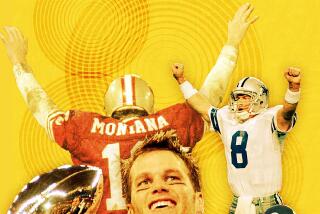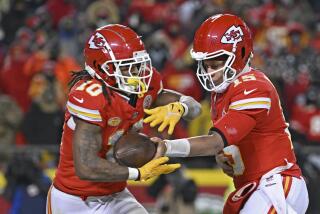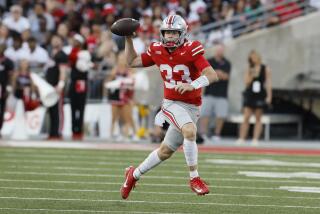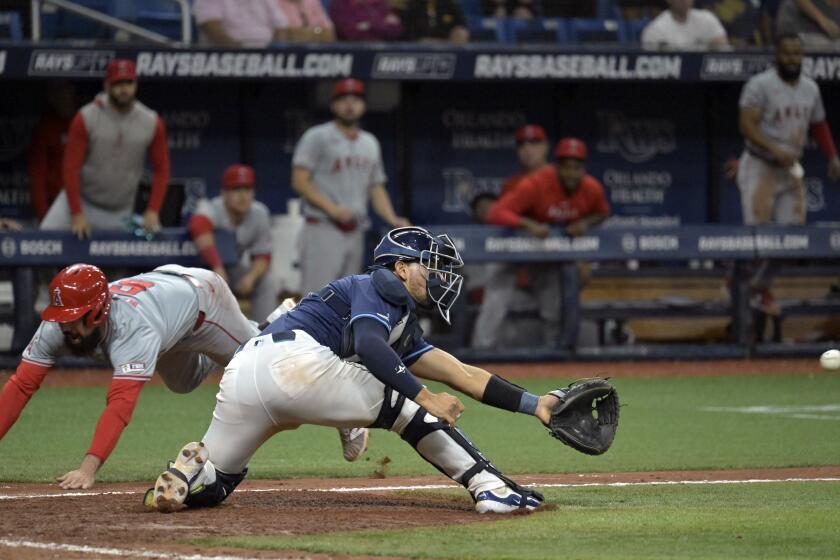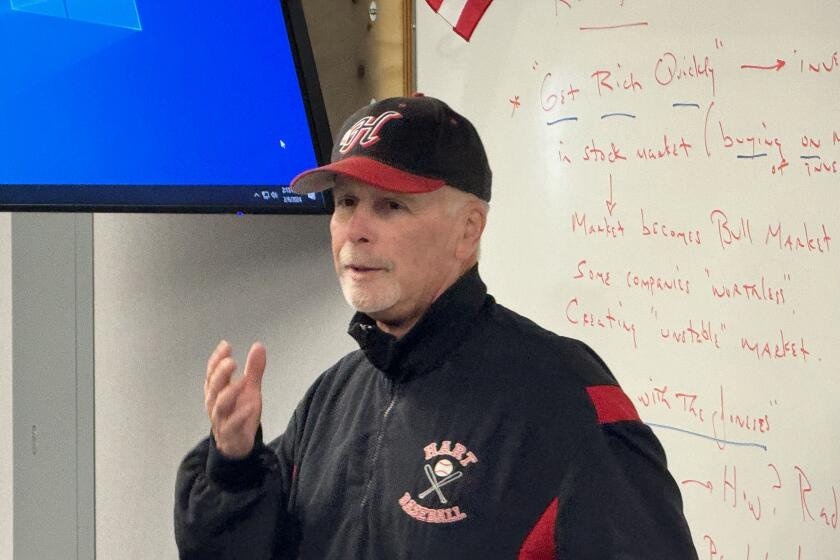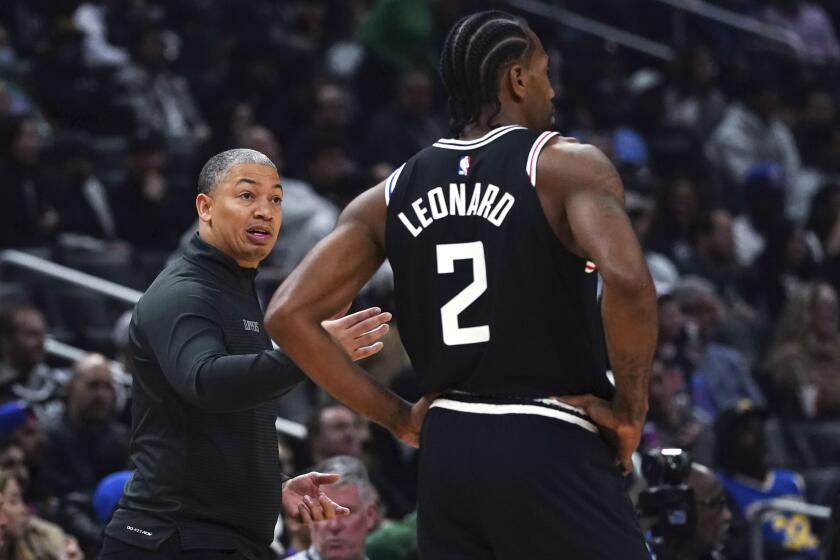NFL openers to feature quarterbacks who are young at start
Five months after his tearful goodbye to quarterback Peyton Manning, Indianapolis Colts owner Jim Irsay ushered in the Andrew Luck era in typical low-key fashion.
“Historic beginning!!!!!!!!!!!!!” Irsay tweeted after Luck’s first NFL pass, a dink to Donald Brown, went for a 63-yard touchdown in an exhibition opener against St. Louis. “The legend has begun!!!!!!!!!!!!!!!!!!”
No one doubted that Luck would be the Day 1 starter, not after the Colts made him the first overall pick in the NFL Draft. Same goes for Robert Griffin III, selected No. 2 by Washington.
But the real eyebrow-raiser is, heading into the first week of the NFL season 10 teams are starting quarterbacks with no more than one season’s experience.
In addition to Luck and Griffin, Seattle’s Russell Wilson, Miami’s Ryan Tannehill and Cleveland’s Brandon Weeden will open their NFL careers as starting quarterbacks.
According to Elias Sports Bureau, since the NFL-AFL merger in 1970 this will be the first season in which more than two rookie quarterbacks will start in openers.
So that’s five rookies and five more starting quarterbacks who were rookies last season: Carolina’s Cam Newton, Cincinnati’s Andy Dalton, Jacksonville’s Blaine Gabbert, Minnesota’s Christian Ponder and Tennessee’s Jake Locker.
“To me it’s one of the most astounding statistics that I’ve seen in the past 25 years, the amount of young quarterbacks that are not only playing early but playing well,” said “Monday Night Football” color analyst Jon Gruden, a former NFL coach who spends a day with each of the top prospects each spring as a part of his ESPN quarterback camp show.
It used to be an accepted practice for young quarterbacks to learn at the elbow of a veteran, and hold a clipboard for a majority of their rookie season or longer before taking snaps in games that mean something.
Aaron Rodgers waited. So did Philip Rivers, Tom Brady, Drew Brees, Eli Manning and many more. Pittsburgh’s Ben Roethlisberger was pressed into action early as a rookie because of an injury to starter Tommy Maddox. It turned out to be a spectacular debut season for Roethlisberger, who had the benefit of an outstanding defense and running game. Counting the playoffs, the Steelers went 14-1 with the rookie under center.
Peyton Manning was the starter throughout his rookie season with the Colts — and from then on — but had his share of growing pains, including a league-high 28 interceptions on a team that finished 3-13.
In the years that preceded that, it was commonplace for a quarterback to wait years to work his way up the depth chart and onto the field. Think Danny White, Steve Young, Jeff Hostetler, Doug Flutie, Gary Kubiak, Rich Gannon …
“Years ago, you would develop a quarterback, there was some patience, you’d give them a couple years,” said Gannon, who was primarily a backup during his first 11 seasons in the NFL, before Oakland brought him in as a starter under Gruden. Gannon led the Raiders to the Super Bowl and was named the league’s most valuable player.
“Anymore, you just throw them out there for a year, year-and-a-half. Like Colt McCoy [in Cleveland]. It’s like, ‘Well, you know, he’s just not … we’ll get Brandon Weeden now.’ We have less patience.”
Sometimes that works; often it doesn’t. A significant milestone in the way teams view rookie quarterbacks came in 2008, when a pair of first-round rookies, Atlanta’s Matt Ryan and Baltimore’s Joe Flacco, started every game on teams that made the playoffs. Never before had a rookie quarterback started all 16 games for a team that reached the playoffs.
The following season, two more rookie quarterbacks, Detroit’s Matthew Stafford and Mark Sanchez of the New York Jets, opened the season as starters.
In 2010, Sam Bradford started every game for St. Louis and was named the NFL’s offensive rookie of the year. Newton matched that feat for Carolina last season, starting every game and winning those honors.
Dalton started every game for the Bengals last season, helping them reach the playoffs (where they lost to Houston, which was quarterbacked by fifth-round rookie T.J. Yates).
There are a host of reasons why many quarterbacks are better prepared to step into NFL jobs at a younger age. Among them, high school and college offenses are throwing much more than they did in years past; college and NFL systems are beginning to bear a closer resemblance to each other, and players are more sophisticated in the way they train and prepare during the off-season.
What’s more, with the money quarterbacks are paid comes additional pressure to get them on the field quickly. A franchise doesn’t want to invest all the required time, resources and money into a young quarterback only to have him watch from the sideline and ultimately sign a free-agent deal with another team.
Even so, some situations are still surprising. The jaw-dropper this season is the Seahawks naming Wilson, a third-round pick, the starter over Matt Flynn, a prized free agent. That club has been searching for an answer at quarterback since Pete Carroll arrived in 2010, including overpaying for Charlie Whitehurst and, apparently, Flynn.
“When Russell Wilson walks in the room, you feel his presence,” Gruden said of the former Wisconsin quarterback, listed at 5 feet 11. “He has an incredible vibe about him that’s outstanding for an offensive football team and a team. And I think he can play it.
“The only downside to this kid is he’s just not tall in some people’s eyes, and I’m just happy that he’s proved the critics wrong so far and I’m pulling for him.”
Wilson led the Badgers to a Big Ten title and a 2012 Rose Bowl berth. This summer, he distanced himself from Flynn with an impressive performance in a 44-14 exhibition victory over Kansas City, completing 13 of 19 passes for 185 yards and two touchdowns, and gaining 58 yards on two rushes.
“He’s earned this job,” Carroll said. “It was a legitimate competition, as we said from the beginning, and with the opportunity he’s taken advantage of, he deserves to start.”
Not so long ago, that decision would have been considered an unbelievable gamble and borderline reckless. In today’s NFL, it’s just another Sunday.
twitter.com/LATimesfarmer
More to Read
Get our high school sports newsletter
Prep Rally is devoted to the SoCal high school sports experience, bringing you scores, stories and a behind-the-scenes look at what makes prep sports so popular.
You may occasionally receive promotional content from the Los Angeles Times.
